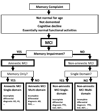Conceptual evolution in Alzheimer's disease: implications for understanding the clinical phenotype of progressive neurodegenerative disease
- PMID: 20061643
- PMCID: PMC2881218
- DOI: 10.3233/JAD-2010-1237
Conceptual evolution in Alzheimer's disease: implications for understanding the clinical phenotype of progressive neurodegenerative disease
Abstract
Over the past several decades, our understanding of Alzheimer's disease (AD) has seen an evolution from the dichotomous concept of normal versus AD in the dementia state to a more accurate and complete appreciation of AD as a progressive disorder with clinical, biological, and pathological features occurring along a continuum from normal to end-stage disease. Integrating our understanding of the relationships and interplay between the clinical, biological, and pathological features of AD may allow the identification of AD at even preclinical, completely asymptomatic stages of the disease. This review attempts to summarize the clinical stages of AD in terms of epidemiology, historical evolution of disease stage diagnoses, cognitive/neuropsychologic features, psychiatric/behavioral manifestations, and functional decline in the context of our developing understanding of the biological processes responsible for the pathogenesis of AD described in detail in the accompanying articles.
Figures


References
-
- Gron G, Riepe MW. Neural basis for the cognitive continuum in episodic memory from health to Alzheimer disease. Am J Geriatr Psychiatry. 2004;12:648–652. - PubMed
-
- Hachinski V. Shifts in thinking about dementia. Jama. 2008;300:2172–2173. - PubMed
-
- Liddell BJ, Paul RH, Arns M, Gordon N, Kukla M, Rowe D, Cooper N, Moyle J, Williams LM. Rates of decline distinguish Alzheimer's disease and mild cognitive impairment relative to normal aging: integrating cognition and brain function. J Integr Neurosci. 2007;6:141–174. - PubMed
-
- Petersen RC. Mild cognitive impairment: transition between aging and Alzheimer's disease. Neurologia. 2000;15:93–101. - PubMed
-
- Gomez-Isla T, Hyman BT. Neuropathological changes in normal aging, minimal cognitive impairment, and Alzheimer's disease. In: Petersen RC, editor. Mild Cognitive Impairment: Aging to Alzheimer's Disease. New York: Oxford University Press, Inc; 2003.
Publication types
MeSH terms
Grants and funding
LinkOut - more resources
Full Text Sources
Medical
Miscellaneous

